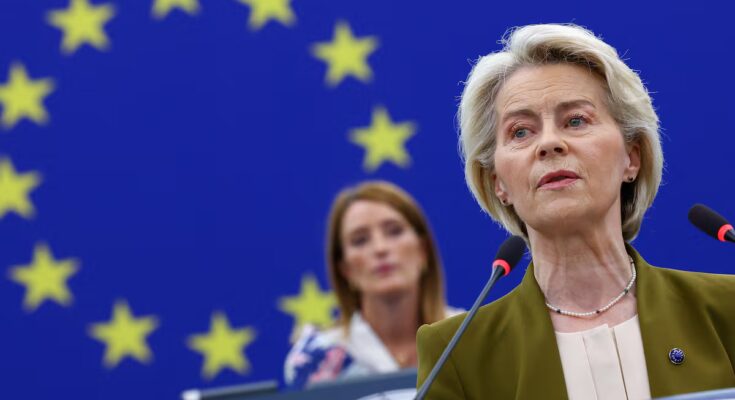The European Commission wants to convince the European Parliament not to reject the draft multiannual budget for the period 2028-2034, as the main parliamentary groups have threatened to do. And to achieve this he has shown that he is willing to make concessions on the aspects on which the criticisms of the parliamentary groups focus: the lack of importance given to the regions, the changes in the common agricultural policy (CAP) or the role assigned to Parliament in these accounts. “Regional control can be introduced to further ensure the full participation of regional authorities in the preparation, implementation and evaluation of plans, as well as to guarantee the right of regional authorities to exchange information directly with the Commission,” reads a letter to which EL PAÍS had access, sent on Sunday by the President of the European Commission, Ursula von der Leyen, to the President of the European Chamber, Roberta Metsola, and to the Danish Prime Minister, Mette Fredriksen, who presides this semester. the Council of the EU.
Since the Commission presented the draft multiannual budget for the period 2028-2034, all parliamentary groups have greeted the proposal with hostility. Concerns have focused on the profound changes proposed in traditional EU policies, such as the CAP or cohesion funds, together with the creation of national plans that would incorporate practically all transfers to member states, subject to a series of reforms agreed between Brussels and the capitals, following the example of the Recovery Fund. This refusal led the four parliamentary forces on which the Commission’s proposals are usually based – with many difficulties and frictions (the European People’s Party, of which she herself is a member, the social democrats, the liberals and the greens) to send Von der Leyen a letter in which they expressed their rejection of the entire budget architecture, starting with the denounced “renationalisation”.
But the parliamentary groups are not willing to stop only at the rejection letter; they are also considering the possibility of promoting a political rejection vote in Parliament, which will take place this week. The European Parliament and the Council of the EU are the two bodies that negotiate the final configuration of multiannual budgets in what is usually the most complex legislative process in the Union. And an example of this is what has already been seen in these four months since the Commission presented the budget, the member states, i.e. the Council of the EU, have made progress in taking a position, taking the project as a valid basis even if it is not shared by many capitals.
Parliament, for its part, has shown its rejection of the very structure of the budget, without discussing the distribution of spending by chapters or sources of revenue. And that is why Von der Leyen tried to seduce them with this letter, advanced by the newspaper Financial times and to which EL PAÍS had access. A meeting is also scheduled for Monday between Von der Leyen, the President of the European Parliament, Roberta Metsola, and Danish Prime Minister Fredriksen.
At this meeting, the details of the letter and the attached document specifying the legal development of the proposed changes will be clarified. It is also very clear that the Commission does not give up on this program model designed between Brussels and the capitals: “We strongly reaffirm that each Member State will be organized according to its institutional and territorial structure as regards the coordination function of the plans”, it clarifies immediately after offering this “regional control” and direct dialogue between the regions and the Commission.
Alongside this, also in line with the role of local and regional authorities, it is underlined that “in addition to the minimum allocation already foreseen for the less developed regions, specific protections can also be taken into consideration to guarantee the continuity of investments in the more developed and transition regions”. To calm the alarms raised by the renationalisation of the CAP and the risk that it will end up diluting common policy objectives, the Commission has designed mechanisms to ensure this does not happen.
Diplomatic sources from the Council of the European Union said on Monday that they did not see any major problems in the document sent by Parliament. They stressed that this aims to calm the concerns of the European Parliament, while pointing out that some member states have expressed similar fears in Council meetings. This indicates, in principle, that the other legislative body of the Union appreciated this move by the Commission. There was a risk that this would not be the case, as other diplomatic sources underlined last week, warning that if the Commission accepted very profound changes in the accounts, it would be the states that would get irritated.



